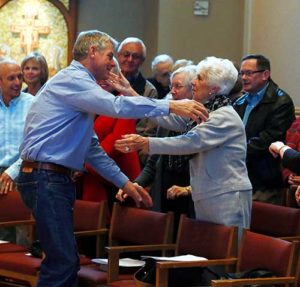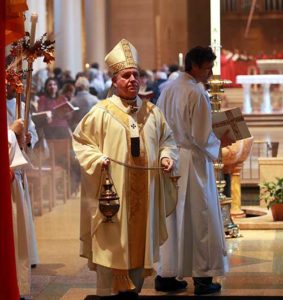MILWAUKEE — As the fall weather gives way to the winter season, the Extraordinary Year of Mercy, designated by Pope Francis, came to a close Sunday, Nov. 20, the Feast of Christ the King. Archbishop Jerome E. Listecki celebrated morning Mass at the Cathedral of St. John the Evangelist with approximately 300 people in attendance.

Worshippers share the sign of peace at the Cathedral of St. John the Evangelist, Milwaukee, during the Mass marking the closing of the Year of Mercy in Milwaukee, on Sunday, Nov. 20.
“On Friday it was 60 degrees, the next day it was 27 (degrees) and snowflakes. When you think you are basking in the springtime remember winter is just tomorrow; don’t put off until tomorrow what you can do today,” said Archbishop Listecki. “This Jubilee Year of Mercy has been about you and God’s ultimate love for you. What he (Jesus) is saying in this Gospel is ‘today you will be with me in paradise.’”
During his homily, Archbishop Listecki cited the story of Dismas, the good thief who was crucified next to Christ.
“He’s an interesting figure that causes us to pause at the end of this jubilee, because he shares a deathbed confession at the eleventh hour. He was faithful to his calling in life, as a thief, and steals redemption at end of his life,” the archbishop said. “It’s our God who is on the cross; underneath that act of suffering is joy.”
At the end of the liturgy, Archbishop Listecki sealed the Holy Door of the cathedral, which was unsealed on Dec. 8, 2015, during the Feast of the Immaculate Conception to begin the jubilee. In his homily, the archbishop compared the Holy Door to a walled-in garden that is uninhabited and protected by an overseer.
“It takes one who is a savior to come in and reopen the doors of the garden and invite us in,” said Archbishop Listecki. “Remember another garden? In terms of our baptism, in terms of our relationship to the faith, we realize the garden that was established by God in terms of the fulfillment of who we were created in the image and likeness of God and to celebrate in his garden.”
Traditionally, Holy Doors are located in the four major basilicas in Rome, but in 2015 Pope Francis declared additional Holy Doors to be open in other dioceses in order to celebrate the jubilee around the world. Observers who pass through the entrance receive plenary indulgences attached to the jubilee.

Archbishop Jerome E. Listecki prepares to incense the Holy Doors prior to closing them, signifying the closing of the Year of Mercy which ended on Sunday, Nov. 20. (Catholic Herald photos by Allen Fredrickson)
“I’ve crossed the Holy Door many times during the Year of Mercy,” said Saul Malandi, a parishioner at the cathedral. “I’ve been inspired to try to give more to the community and to others through various acts of mercy. I’ve seen other people act like Christ toward me. Although the door is closed, it remains open in our hearts to serve others in need.”
Each month throughout the jubilee, Archbishop Listecki and members of the archdiocese took part in pilgrimages to local sites where corporal works of mercy are practiced.
“We’ve had our soup kitchens, we dug wells, we’ve had our clothing drives, we’ve visited the sick, we sought out those who were imprisoned and we buried the dead,” said Archbishop Listecki. “But now Pope Francis is asking us, during this Extraordinary Year of Mercy, to understand why we did those things and we understand because mercy is extended to us. Maybe there is some aspect in our own life where we can share with others, maybe we can reach out to those in need in a very special way.”
The archbishop also noted the importance of the spiritual works of mercy that can be often overlooked and difficult to fulfill, which include: instructing the ignorant, counseling the doubtful, admonishing sinners, bearing wrongs patiently, forgiving offenses willing, comforting the afflicted and praying for the living and the dead.
“Those spiritual works of mercy are the foundation of those corporal works of mercy,” Archbishop Listecki said. “Because the motivation of the corporal works of mercy is that love of Jesus that overflows for us and as we reach out to meet the needs of others, it’s because the total love of Christ has been given to us.”
With the conclusion to the Year of Mercy, Archbishop Listecki anticipates Pope Francis’ challenge of compassion and service will continue to remain foremost in the minds Catholics even after the jubilee.
“What has transpired, in my mind, is the sense of Pope Francis to raise the consciousness about our responsibility toward our brothers and sisters in the Year of Mercy,” said Archbishop Listecki in a Nov. 21 interview with the Catholic Herald. “It’s not that we weren’t performing works of mercy before, that’s our obligation as Christians, but to understand why mercy is our responsibility. What I liked especially about those (works of mercy) is they taught you how to think outside the box and (see) divine mercy being enacted in unique and different ways.”
The archbishop expects many Catholics will continue to participate in the works of mercy highlighted during the jubilee. He also looks forward to the next undertaking Pope Francis will assign to Catholics.
“We wait to listen to the direction of the Holy Father and as a church we will participate and walk with him. What’s next for all Catholics is to live their faith, take a look at our synod and the priorities,” said Archbishop Listecki. “Hopefully, we realize through the Year of Mercy that we have been given a gift and that gift is demanded by Christ to be shared. We find ways to go out and bring people into a relationship with Christ and his church.”
